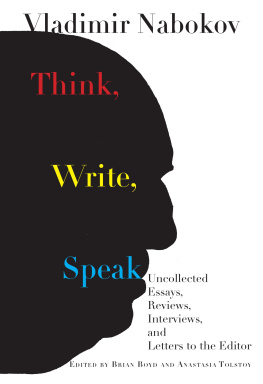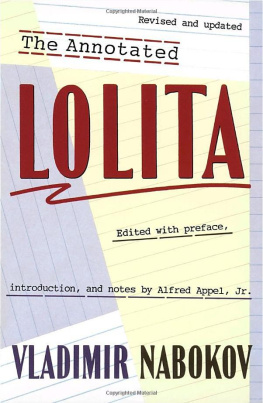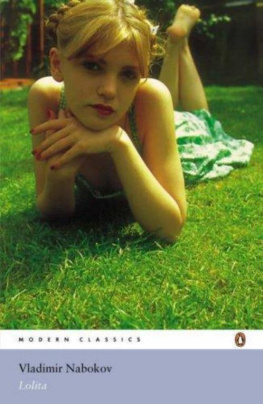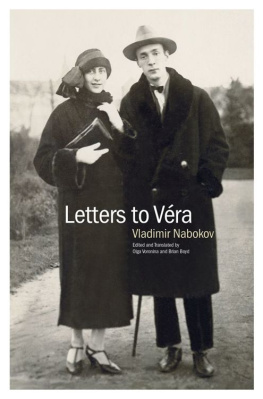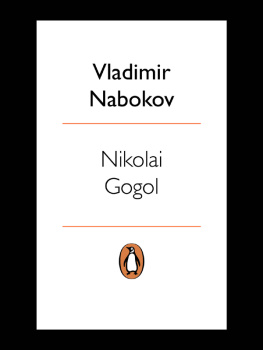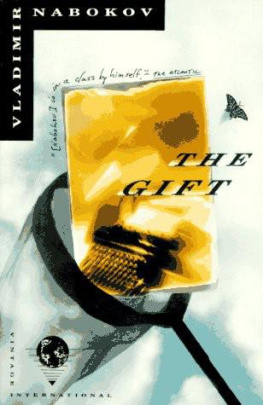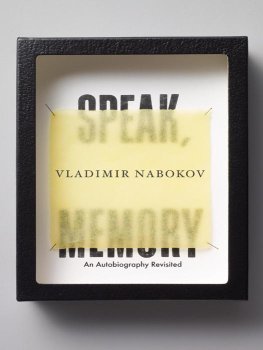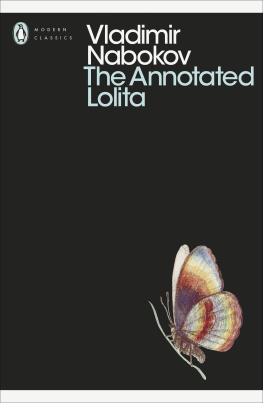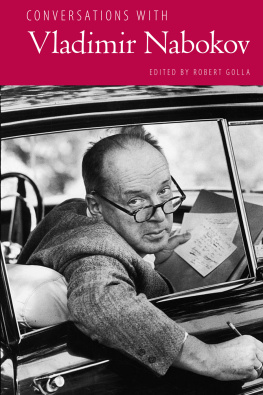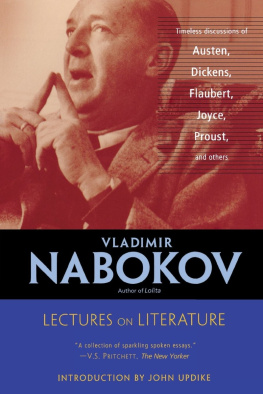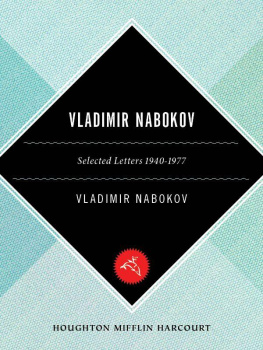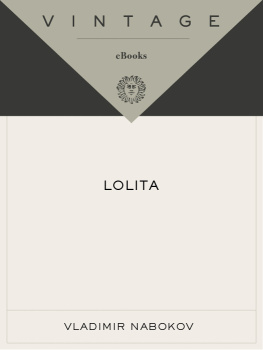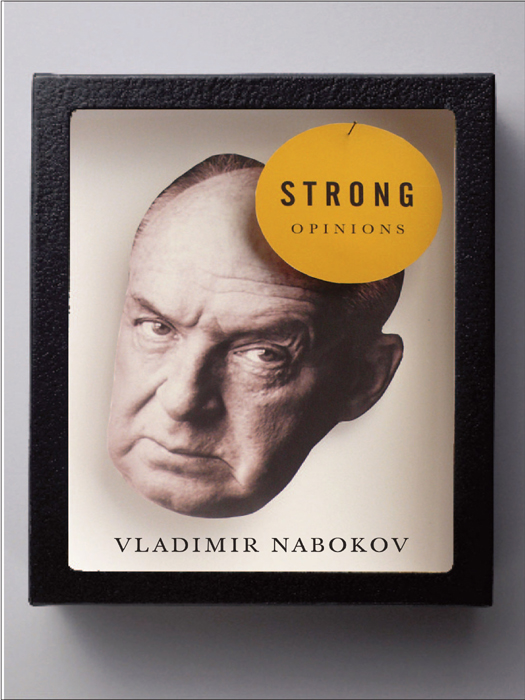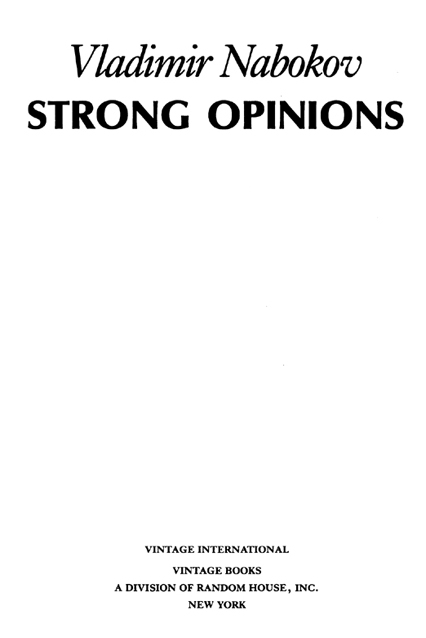BOOKS BY Vladimir Nabokov
NOVELS
Mary
King, Queen, Knave
The Defense
The Eye
Glory
Laughter in the Dark
Despair
Invitation to a Beheading
The Gift
The Real Life of Sebastian Knight
Bend Sinister
Lolita
Pnin
Pale Fire
Ada or Ardor: A Family Chronicle
Transparent Things
Look at the Harlequins!
SHORT FICTION
Nabokovs Dozen
A Russian Beauty and Other Stories
Tyrants Destroyed and Other Stories
Details of a Sunset and Other Stories
The Enchanter
DRAMA
The Waltz Invention
Lolita: A Screenplay
The Man from the USSR and Other Plays
AUTOBIOGRAPHY AND INTERVIEWS
Speak, Memory: An Autobiography Revisited
Strong Opinions
BIOGRAPHY AND CRITICISM
Nikolai Gogol
Lectures on Literature
Lectures on Russian Literature
Lectures on Don Quixote
TRANSLATIONS
Three Russians Poets: Translations of Pushkin,
Lermontov, and Tiutchev
A Hero of Our Time (Mikhail Lermontov)
The Song of Igors Campaign (Anon.)
Eugene Onegin (Alexander Pushkin)
LETTERS
The Nabokov-Wilson Letters: Correspondence between
Vladimir Nabokov and Edmund Wilson, 1940-1971
Vladimir Nabokov: Selected Letters, 1940-1977
MISCELLANEOUS
Poems and Problems
The Annotated Lolita

F IRST V INTAGE I NTERNATIONAL E DITION , J ANUARY 1990
Copyright 1973 by Article 3C Trust
under the Will of Vladimir Nabokov
All rights reserved under International and Pan-American Copyright Conventions. Published in the United States by Vintage Books, a division of Random House, Inc., New York. Originally published, in hardcover, by McGraw-Hill Book Company, New York, in 1973. This edition published by arrangement with the Estate of Vladimir Nabokov.
Library of Congress Cataloging-in-Publication Data
Nabokov, Vladimir Vladimirovich, 1899-1977.
Strong opinions/Vladimir Nabokov. 1st Vintage international ed.
p. cm. (Vintage international)
Originally published, in hardcover, by McGraw-Hill Book
Company, New York, in 1973Verso t.p.
eISBN: 978-0-307-78807-8
1. Nabokov, Vladimir Vladimirovich, 1899-1977
Interviews. 2. Authors, American20th century
Interviews. I. Title.
[PS3527.A15S7 1990]
813.54dc20 89-35741
Additional copyright notices appear under Acknowledgments.
Cover art by Mark Abrams
Photograph of Vladimir Nabokov Rues des Archives/ The Granger Collection, New York
Cover photograph Alison Gootee
v3.1
ACKNOWLEDGMENTS
The interview with Alvin Toffler originally appeared in Playboy magazine. Copyright 1963 by Playboy. Reprinted by permission of Playboy Enterprises, Inc.
The interview with Herbert Gold and George A. Plimpton originally appeared in The Paris Review. Copyright 1967 by The Paris Review. It is reprinted by permission of The Viking Press, Inc., and is included in the fourth volume of Writers at Work, published by The Viking Press, Inc.
Interview with Martin Esslin copyright 1968 by The New York Times Company. Reprinted by permission.
Interview with Nicholas Garnham copyright 1968 by Nicholas Garnham. Reprinted by permission.
Interviews with Alden Whitman copyright 1969, 1971 by The New York Times Company. Reprinted by permission.
Interview with James Mossman copyright 1969 by James Mossman. Reprinted by permission of John V. Mossman.
The interview with Allene Talmey was first published in Vogue. Copyright 1969 by The Cond Nast Publications Inc. Reprinted by permission.
Interview with Israel Shenker copyright 1972 by The New York Times Company. Reprinted by permission.
The interview with Simona Morini was first published in Vogue. Copyright 1972 by the Cond Nast Publications Inc. Reprinted by permission.
Interview with Peter Duval-Smith and Christopher Burstall copyright 1962 by Peter Duval-Smith. Reprinted by permission.
Portions of the interview with Martha Duffy first appeared in Time. Reprinted by permission of Time, The Weekly Newsmagazine; copyright 1969 by Time Inc.
Interview with Jane Howard copyright 1964 by Time Inc. Reprinted with permission.
to Vra
CONTENTS
FOREWORD
I think like a genius, I write like a distinguished author, and I speak like a child. Throughout my academic ascent in America, from lean lecturer to Full Professor, I have never delivered to my audience one scrap of information not prepared in typescript beforehand and not held under my eyes on the bright-lit lectern. My hemmings and hawings over the telephone cause long-distance callers to switch from their native English to pathetic French. At parties, if I attempt to entertain people with a good story, I have to go back to every other sentence for oral erasures and inserts. Even the dream I describe to my wife across the breakfast table is only a first draft.
In these circumstances nobody should ask me to submit to an interview if by interview a chat between two normal human beings is implied. It has been tried at least twice in the old days, and once a recording machine was present, and when the tape was rerun and I had finished laughing, I knew that never in my life would I repeat that sort of performance. Nowadays I take every precaution to ensure a dignified beat of the mandarins fan. The interviewers questions have to be sent to me in writing, answered by me in writing, and reproduced verbatim. Such are the three absolute conditions.
But the interviewer wishes to visit me. He wishes to see my pencil poised above the page, my painted lampshade, my bookshelves, my old white borzoi asleep at my feet. He feels he needs the background music of bogus informality, and as many colorful details as can be memorized, if not actually jotted down (N. gulped down his vodka and quipped with a grin). Have I the heart to cancel the cosiness? I have.
A certain excellent lotion for thinning hair is by nature of an unattractive, emulsive tint. Its makers try to correct this by adding some green colorgreen being meant to suggest, by cosmetological tradition, the freshness of spring, pine-woods, jade, tree frogs, and so forth. The bottle, however, has to be vigorously shaken in order to have its contents viridate; otherwise, in repose, all that shows is an inchwide green border topping the unchanged, genuine, opalescent pillar of liquid. Not shaking the bottle before use is with me a matter of principle.
Similarily, in dealing with the results of interviews as they appear on the printed page, I ignore the floating decor and keep only the basic substance. My files contain the results of some forty interviews in several languages. Only some of the American and British ones have been included here. A few of those have had to be skipped because, by a kind of awful alchemy, and not merely by a good shake, my authentic response got so hopelessly mixed with the artificial color of human interest, added by the manufacturer, as to defy separation. In other cases I have had no trouble in leaving out the well-meant little touches (as well as the gaudiest journalistic inventions), thus gradually eliminating every element of spontaneity, all semblance of actual talk. The thing is transmuted finally into a more or less neatly paragraphed essay, and that is the ideal form a written interview should take.


